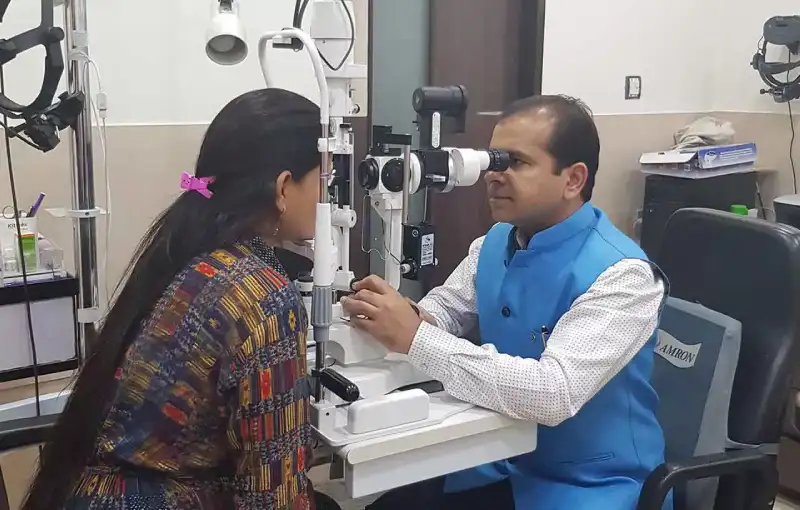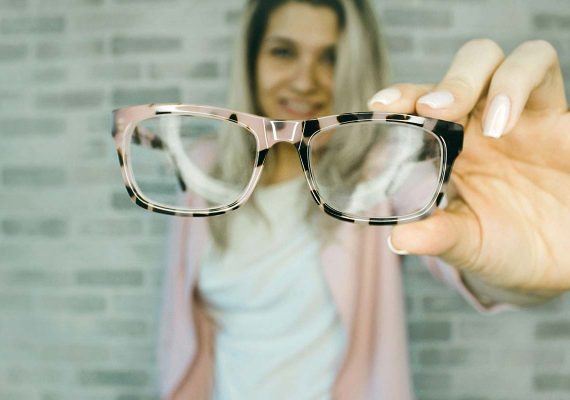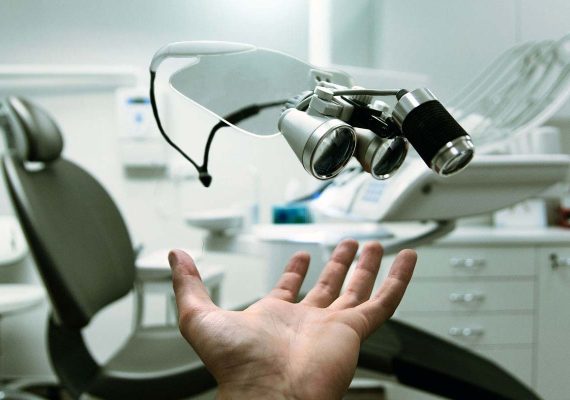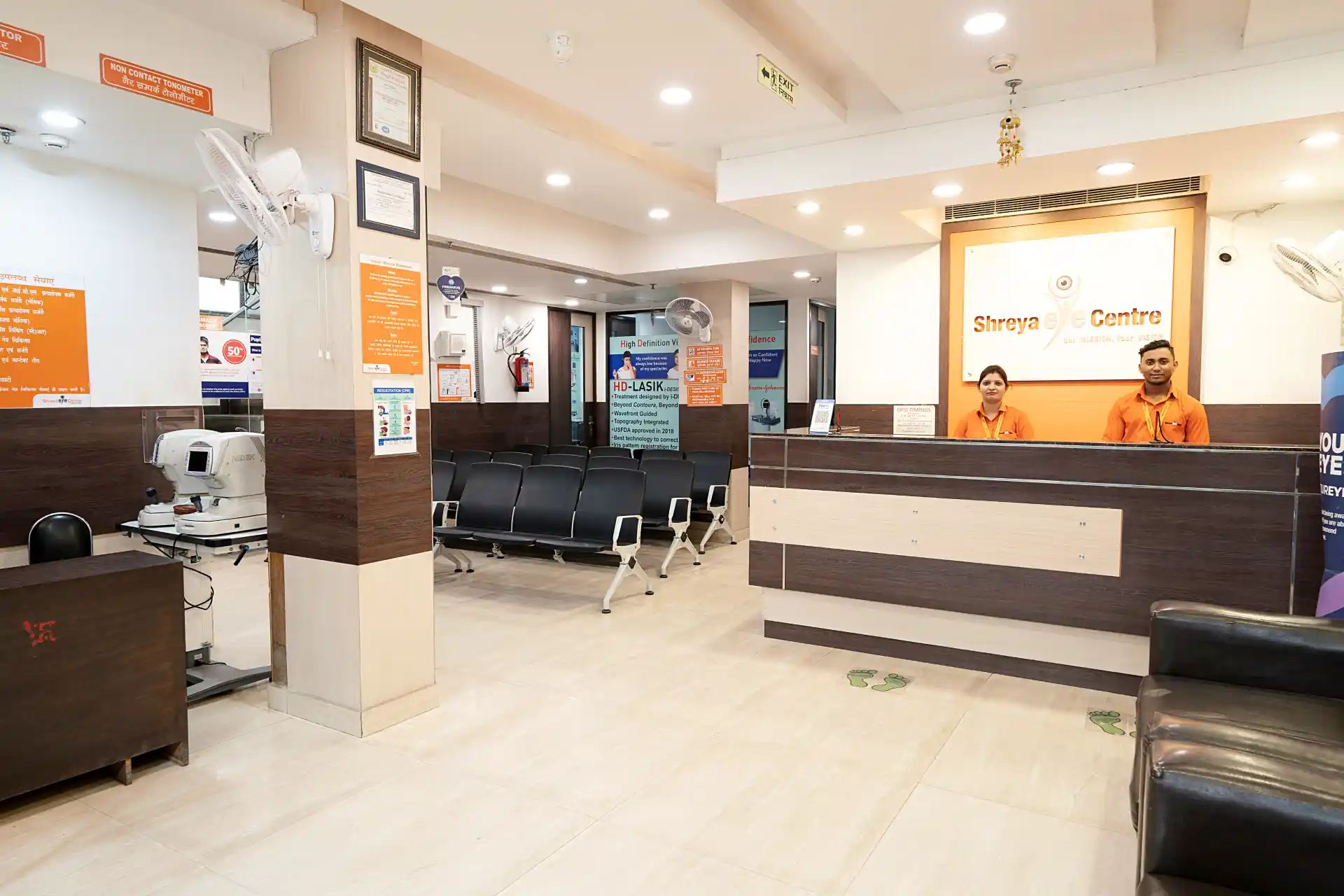Maintaining healthy vision is essential for leading a comfortable and confident life. Regular eye checkups not only help detect common vision problems but also identify serious eye conditions at an early stage. At Shreya Eye Centre, we specialize in providing advanced eye checkup in Delhi, East Delhi & Indirapuram, ensuring that every patient receives comprehensive care tailored to their needs.
Call Now:
+918640046400
Mail Us:
info@shreyaeyecentre.com

Learn About Comprehensive Eye Check Up
- Routine Eye Testing
- To Prevent Eye Injuries
- You Could Be Having Cataract If You Have
- Glaucoma
- Diabetes
- Retinal Tears & Detachment
- How To Use Eye Drops


Routine Eye Testing
- Children should undergo routine eye examinations once a year, especially if he or she complains of symptoms such as headache, tired eyes or inability to see the blackboard clearly.
- Glasses for children should be made of shatterproof plastic or case hardened material. Children should wear their prescribed glasses constantly.
- Any pre-school child with a squint (eyes appearing to be crossed) needs to be urgently examined by an ophthalmologist.
- Adults should have their eyes tested completely every one to three years.
To Prevent Eye Injuries
- Make sure all spray nozzles are directed away from you
- Read instructions carefully before using cleaning fluids, detergents, ammonia or harsh chemicals. Wash your hands thoroughly after use.
- Pay attention to your child’s age and responsibility level when you buy toys and games. Avoid projectile toys such as darts, pellet guns, etc., which can hit the eye from a distance.
- Supervise children when they are playing with toys or games that can be dangerous.
- Teach children the correct way to handle items such as scissors and pencils.
- Never allow children to ignite fireworks.
- Do not stand near others when lighting fireworks
You Could Be Having Cataract If You Have
- Cloudy, fuzzy, fogging, or filmy vision
- Changes in the way you see colors.
- Problems driving at night because headlights seem too bright
- Problems with glare from lamps or the sun.
- Frequent changes in your eyeglass prescription.
- Double vision or multiple images.
- Better near vision for a while only in farsighted people.
These symptoms also can be signs of other eye problems. See your eye doctor to find out what you have and how it can be treated.
Glaucoma
- If you are 40 years of age, or have a family history of glaucoma you should have your eyes tested regularly. See your eye doctor to arrange a test.
- If you have glaucoma, regular eye tests for pressure and the visual field, and taking your eye treatment properly can prevent blindness.
Diabetes
- An eye with marked changes of diabetic retinopathy can have good vision and be totally free of symptoms.
- Hence it is important for all diabetics to undergo regular eye check-up including retinal examination through dilated pupils especially for people who have been diabetic for a number of years.
- It is also true that diabetes is often detected in a person, when some changes of retinopathy are seen on routine examination of the eye.
Retinal Tears & Detachment
- If you notice the sudden appearance of light flashes, or if you suddenly notice a large number of floaters, you should visit your ophthalmologist immediately to see if your retina has been torn.
- Myopes (near sighted persons), aphakics (people who have undergone cataract surgery), those with a family history of retinal detachment are more prone to developing retinal degeneration, holes and tears, and subsequently retinal detachment. These groups of patients must undergo regular and thorough retinal examination by indirect ophthalmoscopy.
How To Use Eye Drops
- First, wash and dry your hands thoroughly.
- Check you have the correct bottle, and make sure you know which eye the drops are to go in.
- Stand in front of the mirror, sit in a chair, or lie down, which ever is best for you.
- Take the top off the bottle, lean your head back, and look up at the ceiling.
- Pull down your lower eyelid and squeeze a drop into you eye, taking care not to ouch the eye with the tip of the bottle.
- Close your eyes for 2 minutes, and wipe gently with a clean tissue, if necessary.
- Put the top on firmly back on the bottle and put in a safe place.
- Finally, wash your hands again.
Remember
- Do not share your drops with anyone else.
- Bottles of eye drops should only be used for four weeks after opening.
- It may help to write on the label, the date you open the bottle.
- It may also help to identify different drops by sticking a colored label on the bottle.
- Your drops can be kept in the fridge but do not freeze them.
- You can get more drops on prescription of your eye doctor.
Important: Use drops in the frequency and for the duration recommended by your eye specialist.
Conclusion
Your eyes are one of the most valuable assets you have, and taking care of them should never be delayed. A comprehensive eye checkup in Delhi, East Delhi & Indirapuram at Shreya Eye Centre ensures early detection, accurate diagnosis, and effective treatment for a wide range of eye conditions. With advanced technology, experienced ophthalmologists, and a patient-first approach, we are committed to helping you maintain clear and healthy vision for life.
👉 Don’t wait for vision problems to affect your daily routine—book your appointment today at Shreya Eye Centre and take the first step toward better eye health.

Schedule Your Eye Care Appointment
Submitting your appointment request is the initial step towards personalized and timely eye care.
Our team will contact you within 24 hours to confirm your appointment. For immediate assistance, please call us directly.
